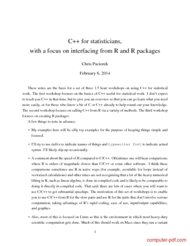C++ for statisticians
In the world of statistical computing, where large datasets and complex models are the norm, C++ has emerged as a powerful tool for boosting performance and efficiency. "C++ for Statisticians" bridges the gap between statistical theory and practical implementation, offering a focused approach to learning C++ specifically tailored for statistical work. This workshop-based guide is perfect for statisticians, data scientists, and researchers who already work with R but need to incorporate faster, compiled code for performance-critical tasks. By focusing on the intersection of C++ and statistical computing, the material provides exactly what statisticians need—no more, no less—to start leveraging C++ in their work.
Learning the C++ for statisticians
The first workshop lays the foundation with C and C++ basics, carefully selected for their relevance to statistical programming. You'll learn about variables, loops, functions, and memory management—concepts that form the core of efficient numerical programming. Rather than attempting to cover all of C++, this section focuses specifically on elements most useful for statistical work, such as working with arrays and implementing mathematical algorithms. For those familiar with R, the guide highlights key differences in programming paradigms, helping you transition smoothly between the two languages when appropriate for your workflow.
A standout feature of this resource is its comprehensive coverage of calling C/C++ from R, the focus of the second workshop. This integration allows statisticians to combine R's ease of use with C++'s raw speed—perfect for optimizing slow loops or implementing custom statistical methods. You'll learn multiple methods for interfacing the languages, including Rcpp, which has revolutionized how statisticians incorporate compiled code into their analyses. Practical examples demonstrate how to pass data between R and C++, handle memory management, and debug hybrid code, giving you the confidence to speed up your R workflows with C++ where it matters most.
The third workshop elevates your skills by teaching how to create R packages containing C++ code. This is where the true power of combining R and C++ becomes apparent, as you learn to package your optimized algorithms for easy sharing and reuse. The guide walks through the entire process: setting up package structures, writing documentation, handling dependencies, and submitting to CRAN. For academic researchers or industry professionals looking to distribute their statistical methods, this knowledge is invaluable—it transforms your code from personal scripts into professional, shareable tools.
What sets this guide apart is its pragmatic, workshop-oriented approach. Each section includes hands-on exercises that mirror real statistical computing tasks, ensuring you gain immediately applicable skills. The material acknowledges that statisticians don't need to become C++ experts—they need to know enough C++ to solve specific statistical computing challenges efficiently. This focus on practical application rather than language mastery makes the content particularly accessible and valuable for its target audience.
Whether you're a graduate student working with large datasets, a researcher developing new statistical methods, or a data scientist looking to optimize your R code, "C++ for Statisticians" provides the perfect entry point to high-performance statistical computing. By mastering these carefully selected C++ techniques and their integration with R, you'll be equipped to tackle computationally intensive problems that would be impractical in pure R. Download this guide today to start building faster, more efficient statistical workflows that combine the best of both worlds.
| Description : | Download free C++ for statisticians, with a focus on interfacing from R and R packages, course material, tutorial training, a PDF file by Chris Paciorek. |
| Level : | Intermediate |
| Created : | August 28, 2014 |
| Size : | 223.43 KB |
| File type : | |
| Pages : | 60 |
| Author : | Chris Paciorek |
| Downloads : | 3961 |
Online Tutorials
